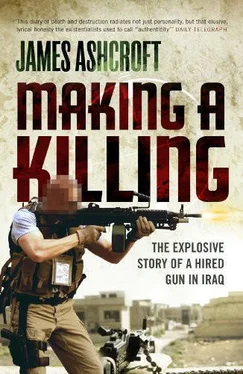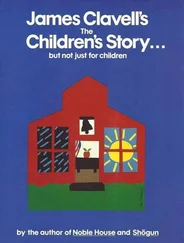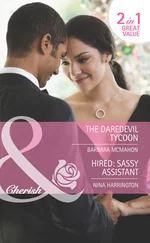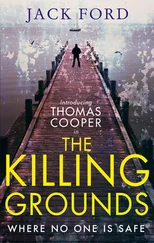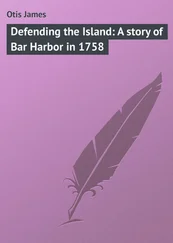‘What do you fancy for dinner tonight?’ I asked Hendriks.
‘What about roast lamb?’
‘For a change!’
‘You can never have too much lamb, Ash.’
‘You want to bet on it?’
‘I only bet on my shooting.’
Hendriks almost smiled. It had been a good day. First contact. No casualties. Not on our side. I’d been in Iraq for a fortnight and in that time Spartan had started to nail down some attractive contracts. Close Protection was a start, especially if all the journalists were going to look like Lori Wyatt.
We collected our burgers and found seats.
‘You done good,’ said Seamus. ‘This round’s on me.’
On the table he dropped an armful of Cokes he’d taken from the free cooler.
The guys in the squad raised their cans.
‘The future.’
It was looking rosy. It wouldn’t stay like that. The Americans were getting itchier trigger fingers as more boxes draped in the flag were flying home. The suicide bombers were learning their deadly craft, and if we had half a mind to, we could already hear the stamping boots of Moqtada al-Sadr’s Al Mahdi Army. They were coming. But that autumn day we raised our Cokes and, while we were contemplating the future, maybe I should wind back to my arrival in Iraq two weeks before.
The shopping plaza at Amsterdam’s Schiphol airport was smaller than I had expected, although I did manage to get a good price on a digital camera to take some photos when I got to Basra.
I had treated myself to a pair of duty-free shades in Heathrow; nothing fancy, these were a black, utilitarian pair of mountaineering sunglasses that would keep the desert dust and sun from creeping in around the edges. I was relieved to see that the same pair wasn’t any cheaper in Amsterdam.
With only forty minutes to go before my flight to Jordan, I made my way to the departure gate and was appalled to find two dozen Texan oil workers on their way to Iraq filling the seating area. Any terrorist worth his salt could have had a field day, or would certainly have been able to call ahead and let any contacts in Jordan know that a busload of infidels was on the way.
You didn’t need the brains of an archbishop to spot these guys. Five of the men were wearing cowboy hats. The rest of them were wearing baseball hats glorifying either ‘Houston’ or ‘Dallas’, with one exception, but he made up for it by wearing a Stars and Stripes T-shirt. I also counted four large belt buckles in the shape of the state of Texas, six of those silver-tipped leather thong neckties that cowboys wear and one T-shirt that said ‘NYPD 9/11, Proud to be a Patriot’.
But there was another reason why I knew they were going to ‘Goddamn I-raq ’ and that was because they were talking about it at the tops of their voices◦– and the entire group were wearing transparent wallets around their necks containing labels with their names in bold and ‘KBR IRAQ’ in letters two inches high.
I slunk away to the far corner of the lounge where I noticed another man standing with his back to the wall, sneering at the Americans. He was in his late thirties, sandy-blond hair, average height, stocky and well-muscled with a dark tan marred only by pale skin around his eyes and in narrow strips from his eyes to his ears where he had been wearing shades. He sported a grey polo shirt, sand-coloured combat pants, tan hiking boots, an expensive diving watch and on his forearms were depressingly familiar British squaddie tattoos. A daysack with a multitude of little pouches sat at his feet. Another security man, and as obvious as the Texans.
I looked down at my sandy-coloured cargo pants, diving watch, daysack and hiking boots.
The squaddie and I ignored each other. I mentally made a note that on future trips I would dress like a tourist.
I had printed out some of Angus McGrath’s emails and on the flight I read them through. The insurgency was spreading in the north and in central Iraq, but I was heading for Basra, in the southern sector, and it was less volatile thanks to the professional restraint of the British troops in occupation, something I had witnessed in several operational theatres. Hundreds of years of colonial policing had left the experience of interacting with indigenous peoples in the bones of the British Army.
Despite the fact that the Brits were mostly to blame for creating the mess in Iraq by imposing a Sunni monarch, Emir Faysal ibn Husayn, at the end of the First World War, I would discover that the Iraqis respected the British and considered us harsh, a sign of strength, but fair◦– in spite of the fact that the British had gassed the Kurds when they revolted in the 1920s, and had built most of the country’s petrochemical infrastructure in order to better plunder the rich resources.
The British learned the local languages and showed respect to the sheikhs and imams. The old adage that an Englishman’s word is his bond still rang true for Iraqis whether Assyrian Christian, Sunni, Shia, Turkman or Kurd. When arranging meetings later in the year I would be puzzled that my Iraqi interpreters would ask whether the meeting was at British nine o’clock or Iraqi nine o’clock. The latter meant any time before lunch, whereas ‘British’ time meant you sat down at nine with notebooks ready.
The Shia uprising against Saddam after the first Gulf War in the early nineties had been brutally subdued. The Shia had been jubilant to finally see an end to the dictator and Shia militias were now prowling the southern cities slaughtering every former Ba’ath Party official they could lay their hands on. There were about 130,000 American troops in Iraq, ten times as many as the Brits, but statistically, a British soldier in the south had the same probability of being killed or wounded. It was shocking to me that so few British troops had been deployed to maintain order over such a vast area of the country. Once again Tommy Atkins was being stretched to the limit by his oblivious masters in Whitehall.
As a private security contractor, I was going to be a lot safer in Basra, where there were only three attacks a day, than in Baghdad, where there were now as many as fifty. In fact, most attacks in the south were not anti-British, but turf wars between rival militias. As one contractor told me, when you were driving in the south, as long as you stayed out of Basra itself, the biggest danger was falling asleep at the wheel, whereas driving in Baghdad was ‘like Stalingrad’, he said, with everyone shooting at each other.
The chaos should have been expected after the despotic rule of Saddam Hussein, a virtually illiterate tribesman from Tikrit who had worked his way through the ranks of the Revolutionary Command Council after the monarchy was toppled in 1958. He had been the de facto ruler of Iraq for some years before officially being made head of state in July 1979. His initial popularity for ridding the country of the last vestiges of colonialism quickly faded and the people suffered through nearly thirty years of tyrannical fascism and a horrific eight-year war of attrition with Iran which had killed an estimated one million people.
Despite having his arse kicked back into Iraq after invading Kuwait in 1990, Saddam had achieved a heroic status among Arabs by going toe to toe with America and surviving in battle against the much vaunted army of the Great Satan.
The flight passed without incident and darkness shrouded the countryside as we approached the golden sparkle of lights that was Amman. Upon arrival at Queen Alia International Airport I was very glad that Angus McGrath had briefed me on the procedure for Jordanian immigration.
‘Make your way straight to the passport control desks,’ he had said. ‘The far right-hand desk sells visas to foreigners and no one knows because the sign’s so fucking small you cannae see it. But don’t go there yet because you have to buy the visa with ten Jordanian dinars. Go to the back of the hall where there’s a bureau-de-change and change some money first.’
Читать дальше
